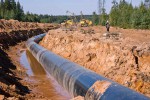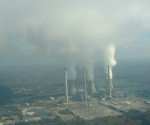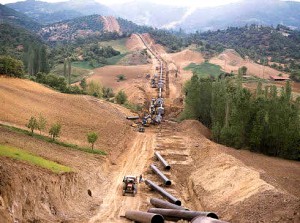Update: April Keating reports that FERC has informed her that people can make comments to FERC up until the day a pipeline is approved. So, continue piping up! FERC is especially looking for comments during the EIS period, which is the time the agency is trying to identify problems. Pipe up!
We wanted to make sure you know about these FERC public scoping meetings on the proposed Atlantic Coast Pipeline:
Tonight, Monday, March 23, 2015 at 7:00 PM. Elkins High School, 100 Kennedy Drive, Elkins, WV.
Tomorrow, Tuesday, March 24, 2015 at 7:00 PM. Bridgeport High School, 515 Johnson Avenue, Bridgeport, WV.
Details here: WV Scoping Meetings for Atlantic Coast Pipeline in Elkins & Bridgeport
Here, from the MARE project, are some sample comments you may use to build your own comments.
Allen Johnson with Christians for the Mountains alerts us: be sure to arrive early and sign up early if you want to speak.
A hearing in Virginia was jammed packed, with pipeline supporters from outside the area, apparently bussed in by Dominion, all of whom signed in several hours before the meeting began.
You’ll likely have about three minutes to comment, but you can send in more extensive written comments, whether you speak at any of the hearings or not.
Details on filing written comments are here. Submit your comments by April 28.
For inspiration, you might want to check out this article: Seeking Dominion over His Own Land














Attention: Kimberly D. Bose
FERC Docket Number# ACP — PF15-6-000
An environmental impact statement (EIS) for the Atlantic Coast Pipeline
• The pipeline impacts need to be evaluated and studied for all phases of the project, from construction through completion. FERC should evaluate, explain and have thourough contengencey plans for environmental impacts before construction, including and most importantly safety for citizens and the environment. These should include but are not limited to the following: the potential use of fly ash for backfill, and cumulative impacts following the completion of the pipeline, such as any and all types fracking and impact of fracking to land and water.
• FERC should stop out of state private corporations from threatening land owners with eminent domain when these corporations have no plans to benefit the citizens of WV. These citizens also are currently being served by existing pipelines and are not intrested in doing forced business with these types of rogue corporations. Putting profits before people is unconstitutional and should be avoided at all costs.
• The Monongahela National Forest is sensitive ecosystem, and FERC should avoid impacting this area. Constructing a pipeline will increase forest fragmentation, so FERC avoid destruction of our protected forest and intstead study the impact such a pipeline would have on local wildlife.
• Geology and soils: West Virginia contains many unique geologic features including an extensive underground cave system that is an important part of WV tourism. FERC should also study the impacts of increased sedimentation from fracking runoff and loss of topsoil during any type of construction but never allow a pipeline to occur.
• Land use: WV is known for its outdoor recreational opportunities. FERC should realize how the pipeline would greatly impact and decimate outdoor recreation and tourism but not allow a pipeline to ever alter this precious
• Water resources, fisheries and wetland: The pipeline will have to cross numerous streams, rivers, and wetlands. FERC should study how many crossings will occur, the acres of wetlands to be disturbed and how the pipeline will impact springs and drinking water sources. Impacts to freshwater streams will also affect fisheries resources, which is an important part of the state’s ecology and tourism. With impacts to the hydrology there could be cumulative effects such as flooding, so FERC should study how the construction impacts from disturbing streams and wetlands will impact flood events. FERC should get outside studies done on how Fracking would impact our water resources, fisheries and wetlands. By getting several outside studies done this will prove how dangerous fracking is to our citizens and environment.
• West Virginia contains many cultural resources, such as Native American and civil war artifacts; How the will the pipeline’s construction will impact these cultural resources?
• Vegetation and wildlife: Appalachian mountains contain very diverse vegetation that provide a lot of economic benefits such as ginseng and several tree species such as red spruce that are already in decline. FERC should study how the pipeline will impact these and other important vegetation species. West Virginia has diverse wildlife populations from large mammals to small salamanders that play an important role in the ecosystem. FERC should study how the construction will impact West Virginia’s wildlife species including breeding and nesting grounds, migration routes, and increased predation from the proposed pipeline corridor. How will fracking impact all of this?
• Air Quality and Noise: Compression stations and construction will diminish air quality and have increased noise levels. The proximity of the compressor station and pipeline to communities and nearby residences and how to mitigate adverse effects should be fully studied.
• Endangered and Threatened Species: West Virginia contains many threatened and endangered species; evaluate how the pipeline will impact all the threatened and endangered species through disturbance, habitat loss, breeding, etc and how the negative impact will be mitigated or avoided.
• Public Safety: Because of the flammability of natural gas, the pipeline is at risk of an explosion. FERC should consider the blast radius should an explosion occur and how many residences are within the blast radius. Further, they should study mitigation efforts to avoid densely populated areas. Study the health risks associated with living near a compressor station or a leaking natural gas pipeline. Study fracking earthquakes will they have an impact on WV’s infrastructure, interstates, dam’s and citizen’s homes, bridges and historic buildings?
Thank you for your time and consideration.
Sincerely,
Lisa Bragg